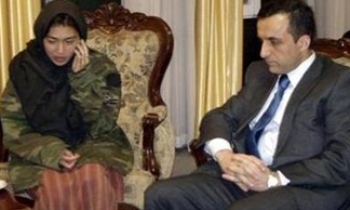JAKARTA, Sep 26 (IPS) - An Indonesian journalist has news for those of the country's Muslims who have turned to terrorism to express rage. ''Journalism is my jihad,'' says Agung Rulianto, who leads a team of investigative reporters for the 'Tempo' weekly magazine.
While the term jihad is often used to refer to armed struggle many Muslim scholars are agreed that it denotes a striving of any type including intellectual or spiritual attainment.
The September issue of Tempo carried the provocatively titled article 'A New Breed of Terrorist' that has caused ripples in Indonesia, the world's most populous Muslim country. ''They are the enemy of the state, the enemy of the people, and we have a responsibility to expose them,'' said the 35-year-old in an IPS interview given at the editorial offices of the magazine, known for its hard-hitting exposes.
''This violence is a bad move by some Muslims and I am a Muslim and I cannot support it,'' adds Agung, who has been tracking terrorism in Indonesia since the first round of bombs were detonated in a popular tourist strip in the resort island of Bali in October, 2002, killing 202 people and wounding 300 others.
Tempo's cover story, which took two months to investigate, is built around a new 'how-to' handbook of terrorism that radical Muslims here are using. The 82-page manual ''provides instructions on how to set up independent jihad cells'' in as little time as six months.
This book provides ''an ideological thesis'' to ''justify the use of terrorism to carry out jihad.'' And subsequent chapters provide a blueprint detailing methods ''for fundraising, recruiting cell members, assigning tasks to each member, training tactics and how to organise meetings.''
Tempo's timing is relevant, since the ''months of jihad'' or the ''bombing months'' are upon this South-east Asian archipelago. The reference is to the fact that bombing campaigns between 2001-2005 in Jakarta, Bali and Makassar occurred during the months of August and October.
Consequently, there is fear that the holy month of Ramadan, which Indonesian Muslims began to observe over the weekend, will encourage Indonesia's terror squads. ''We want the month to be peaceful, but unfortunately the bombings happen at this time,'' says Hermein Kleden, Tempo's managing editor. ''In the past five years, bombings have happened around big religious events.''
It is a prospect that troubles moderate Islamic teachers like Mohammad Dian Nafi, headmaster of the Al-Muayyad ‘pesantren' (Islamic school), in Solo, in central Java. ''Ramadan is meant for spiritual activity for God and for humankind,'' he said over telephone. ''The month stresses the need for self-control.''
His school, set up in 1992, has a new feature in the curriculum this year. During the month of Ramadan it will take under it swings 30 street children and introduce them to ''social harmony, human values, positive action and building a religious habit at the personal level.''
Indonesian analysts are more critical of their fellow countrymen who wreak havoc during the Ramadan. ''You are not supposed to kill during the month of fast. Seen from this perspective, it does not make sense,''
Prof. Dewi Fortuna Anwar, a respected researcher at the Jakarta-based Indonesia Institute of Science, told IPS. ''There is no glory in suicide in religion. Because one's life doesn't belong to you, but belongs to God.''
She blames the steady indoctrination by ''misguided preachers'' for making this form of violence attractive -- and explains its spread among Indonesian males in their late teens and early twenties. Her research has revealed that the young men who fill the ranks of the terror squads come from lower socio-economic backgrounds. ‘'Most are not highly educated.''
The case of Mohammed Cholily, however, is a reminder that there are many exceptions. In early September, the 28-year-old was sentenced by a court in Denpasar, Bali, to 18 years in jail for his role in providing material for the October 2005 suicide bombing on the resort island, which killed 20 people and injured 102. He was also found guilty of assisting Noordin Mohammed Top, described by analysts as ‘South-east Asia's most wanted terrorist,' to escape. Cholily, who belonged to an East Java cell of the militant network, was an engineering student at Malang State University.
But as the International Crisis Group (ICG) notes, the spread of radical Islamic ideology in Indonesia has also been shaped by other factors that explain the capacity of this terror network to adapt and reinvent itself over time. ''No understanding of jihadism in Indonesia is possible without understanding the Darul Islam movement and its efforts to establish the Islamic State of Indonesia,'' the Brussels-based think tank states in a study.
''Over the last 55 years, that movement has produced splinters and offshoots that range from Jemaah Islamiyah (JI) to non-violent religious groups,'' it adds. ''Every time the older generation seems on the verge of passing into irrelevance, a new generation of young militants, inspired by Darul Islam's history and mystique of an Islamic state, emerges to give the movement a new lease on life.''
JI has been identified as the most likely group that orchestrated the October 2002 Bali bombings and attacks since then. Intelligence reports suggest that the group, which means ''Islamic community,'' aims to create a pan-Islamic state in South-east Asia, encompassing Malaysia, Indonesia, Singapore and southern Philippines.
JI is also said to be linked to Osama bin Laden's al Qaeda network, given the number of Indonesian men who went to Afghanistan in the early 1990s to wage a jihad in defence of that South Asian nation. It is a connection that has led the United States to describe this part of South-east Asia as another front in its ‘'war on terror.''
For Agung, JI is one piece of a ''jigsaw puzzle we have to put together, but there are many pieces out there''. And there is hardly a hint of fear in taking on such deadly adversaries. ''We cannot let them get away,'' he says.









